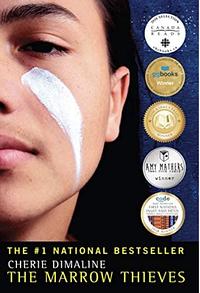Take a photo of a barcode or cover
adventurous
dark
emotional
hopeful
inspiring
reflective
sad
tense
medium-paced
Plot or Character Driven:
Character
Strong character development:
Yes
Loveable characters:
Yes
Diverse cast of characters:
Yes
Flaws of characters a main focus:
Yes
adventurous
challenging
dark
mysterious
reflective
sad
tense
medium-paced
Plot or Character Driven:
A mix
adventurous
challenging
dark
emotional
sad
medium-paced
Plot or Character Driven:
A mix
Strong character development:
Yes
Loveable characters:
Yes
Diverse cast of characters:
Yes
Flaws of characters a main focus:
Complicated
This book was outside of my usual genre. It had strong characters, male and female. There was good queer representation, though it wasn't the focal point of this story. It poked at oft ignored social issues.
Ultimately, the short version is this: I wanted to like this book a whole lot more than I ended up liking it. The roots of this problem could like in the genre mismatch between my usual preferences and the YA audience that it is conceivably written for, but I'm not sold on that idea. After all, pretty heavy stuff is dealt with uncompromisingly, albeit occasionally in flashbacks (as if that alleviates the stress): children are killed, girls and women are serially sexually abused, and violence is a naturalized part of the world. At the same time, the relatively juvenile relationships are a little... skippable, perhaps.
On the positive side, I think that this is a very readable post-apocalyptic story told from a perspective that too often goes spoken for or speechless, and I feel that it is about time that First Nations, Metis, and Inuit writers find more space in and breaking out from the Canadian literature rubric. So that's all to the good. More critically, however, I found that the plot fell somewhat flat for me, where happenstance mostly guides events, which is not a deal breaker but perhaps the source of what some other readers detect as a lack of narrative thrill. Everything is certainly well told, and at times the language rises to an occasion for a climax here and there – great! But there's an aimlessness to the story that reflects in the characters' own general wandering: is theirs a story of resistance (sometimes), survival (sometimes), finding family (improbable, but the most convincing), or...?
More troubling to me is the underwhelming sense of the structures of violence in this postapocalypse. Clearly, ecological collapse has occurred, which is very foreseeable. But then there's this softly spoken relationship between Canadian colonial society, which has... stopped dreaming? - very unclear! - and the bodies of indigenous peoples, who are... killed? to make pellets of dreams. (From their marrow? It seems like a really significant detail, but I didn't see it.) I get that the story wants to focus on its indigenous characters and I sympathize immensely with that, but the frame never makes much sense to me on a diegetic level.
Where the framing does make sense is at the metaphorical level, where the most convincing argument is that colonial societies lack the foresight and purpose to live in a new life, and indigenous peoples have maintained that inner purpose and vision. Great! Except it never quite comes across, and to be honest I don't know what that would actually look like if it's not a metaphor. Essentially, the characters mostly journey North on a hunch that it is further from the colonized south, and yet as many from the North of this continent might suggest, theirs is a too-frequently mythologized place of frontiers and should not stand in for a utopia. Climate change is transforming the North two to three times as rapidly as it transforms the more temperate south of the country, and if contemporary commercial interests are any indication, it will probably be more drastically colonized the quicker that change happens (see, for instance, Russian and Chinese interest in the Northern Sea Route). What does a new life look like for those on the run once they stop running? Beyond the characters' desires for human connection with their parents and loved ones - entirely familiar to any Victorian bookstop – I'm not really sure what that ability to dream really looks like in the world of the novel. And that's a shame, because it's one of the more powerful things that the book cherishes as the strength of its characters.
There's more that I thought about after finishing this book that left me a little uneasy. I found it sympathetic, then odd, that the major sources of fear and violence were ones so real and familliar to the past - residential schools and the Church - not because I discount their history, which lives on in survivors, the TRC, and the memory of those who operated them well into my lifetime, but because they seem today to have receded into the spectre of new neoliberal politics that are true spaces of violence and possible tension in a postcolonial future. I realize that this is a contentious point, however, and appreciate that their appearance ties up a kind of cyclicality to the novel's past and imagined future in a way that binds it to the living memory of the present.
A longer write-up of impressions than I'd usually do, but simply because the book deals in such resonant and important topics - and because it invites its readers into its world.
On the positive side, I think that this is a very readable post-apocalyptic story told from a perspective that too often goes spoken for or speechless, and I feel that it is about time that First Nations, Metis, and Inuit writers find more space in and breaking out from the Canadian literature rubric. So that's all to the good. More critically, however, I found that the plot fell somewhat flat for me, where happenstance mostly guides events, which is not a deal breaker but perhaps the source of what some other readers detect as a lack of narrative thrill. Everything is certainly well told, and at times the language rises to an occasion for a climax here and there – great! But there's an aimlessness to the story that reflects in the characters' own general wandering: is theirs a story of resistance (sometimes), survival (sometimes), finding family (improbable, but the most convincing), or...?
More troubling to me is the underwhelming sense of the structures of violence in this postapocalypse. Clearly, ecological collapse has occurred, which is very foreseeable. But then there's this softly spoken relationship between Canadian colonial society, which has... stopped dreaming? - very unclear! - and the bodies of indigenous peoples, who are... killed? to make pellets of dreams. (From their marrow? It seems like a really significant detail, but I didn't see it.) I get that the story wants to focus on its indigenous characters and I sympathize immensely with that, but the frame never makes much sense to me on a diegetic level.
Where the framing does make sense is at the metaphorical level, where the most convincing argument is that colonial societies lack the foresight and purpose to live in a new life, and indigenous peoples have maintained that inner purpose and vision. Great! Except it never quite comes across, and to be honest I don't know what that would actually look like if it's not a metaphor. Essentially, the characters mostly journey North on a hunch that it is further from the colonized south, and yet as many from the North of this continent might suggest, theirs is a too-frequently mythologized place of frontiers and should not stand in for a utopia. Climate change is transforming the North two to three times as rapidly as it transforms the more temperate south of the country, and if contemporary commercial interests are any indication, it will probably be more drastically colonized the quicker that change happens (see, for instance, Russian and Chinese interest in the Northern Sea Route). What does a new life look like for those on the run once they stop running? Beyond the characters' desires for human connection with their parents and loved ones - entirely familiar to any Victorian bookstop – I'm not really sure what that ability to dream really looks like in the world of the novel. And that's a shame, because it's one of the more powerful things that the book cherishes as the strength of its characters.
There's more that I thought about after finishing this book that left me a little uneasy. I found it sympathetic, then odd, that the major sources of fear and violence were ones so real and familliar to the past - residential schools and the Church - not because I discount their history, which lives on in survivors, the TRC, and the memory of those who operated them well into my lifetime, but because they seem today to have receded into the spectre of new neoliberal politics that are true spaces of violence and possible tension in a postcolonial future. I realize that this is a contentious point, however, and appreciate that their appearance ties up a kind of cyclicality to the novel's past and imagined future in a way that binds it to the living memory of the present.
A longer write-up of impressions than I'd usually do, but simply because the book deals in such resonant and important topics - and because it invites its readers into its world.
adventurous
dark
emotional
hopeful
sad
tense
medium-paced
Plot or Character Driven:
A mix
Strong character development:
No
Loveable characters:
Complicated
Diverse cast of characters:
Yes
Flaws of characters a main focus:
No
omgggg this was such a powerful and touching book. definitely something that I couldn't rush through because it was so intense (tw genocide) but that ending, ya'll. <3 <3
adventurous
emotional
mysterious
reflective
tense
medium-paced
Plot or Character Driven:
A mix
Strong character development:
No
Loveable characters:
Yes
Diverse cast of characters:
Yes
Flaws of characters a main focus:
Yes
This is YA so it's an easy read. Felt like the hopeful atmosphere (like all problems can be solved as long as we stick together) didn't drive home all the horrible things happening very well? Idk I read this for a climate fiction seminar and the other work I read for it just felt more realistic so maybe I'm just contrasting too hard.
This was an inventive tale that reminds us of history. It was an interesting and introspective story of a plight of people hunted down. It was a bit too future/sci-fi-y in the marrow that the bad guys seek and the dreams I couldn't get into much, but overall a good read that should be read as a reflection on past actions.
challenging
emotional
hopeful
fast-paced
Plot or Character Driven:
A mix
Strong character development:
Yes
Loveable characters:
Yes
Diverse cast of characters:
Yes
Flaws of characters a main focus:
Yes






